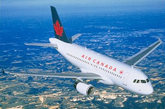Airbus and Air Canada are performing today North America’s first “Perfect Flight” over international borders, with the goal of cutting CO2 emissions by more than 40 percent compared to a regular flight.
The commercial flight on an Airbus A319 aircraft from Toronto, Canada to Mexico City will combine the use a modern, state-of-the-art aircraft, powered by sustainable alternative fuels, guided by streamlined Air Traffic Management procedures and facilitated through best practice operations to under-pin the industry’s four pillar strategy to tackle carbon emissions.
The Air Canada flight (AC991) is the second leg out of a series of four biofuel flights taking the Secretary General of the International Civil Aviation Organization (ICAO) Raymond Benjamin to Rio de Janeiro for the United Nations Conference on Sustainable Development (Rio+20).
The flight combines best operational and environmental practices available today. Dubbed as "Perfect Flight", it includes:
- Operation of the most eco-efficient aircraft family in its market segment.
- Use of sustainable bio-fuel blend (a 50 percent blend) made from used cooking oil supplied by SkyNRG.
- Optimized routings and flight altitude. In agreement with the Air Traffic Management authorities, the Airbus A319 will fly the most direct route, using the most efficient vertical flight profile and applying a Continuous Descent Approach (CDA) into Mexico City to save fuel and limit noise.
- Combination of several eco-efficient operational procedures such as single engine-taxiing, external aircraft cleaning for improved aerodynamics, light weight cabin equipment and a neatly tailored flight plan.
“Today’s flight with Air Canada proves that the aviation industry is in a strong position to reduce emissions and fly many more Perfect Flights,” said Fabrice Brégier, Airbus President and CEO. “To make this a day-to-day commercial reality, it requires now a political will to foster incentives to scale up the use of sustainable biofuels and accelerate modernization of the air-traffic-management system. We need a clear endorsement by governments and all aviation stakeholders to venture beyond today’s limitations.”
“Air Canada fully accepts its responsibility to reduce its footprint and our first flight using biofuel tangibly demonstrates our ongoing commitment to the environment. Since 1990 our airline has become 30 per cent more fuel efficient and we are determined to increase these gains through cutting-edge measures such as those being showcased with this Airbus A319 Toronto-Mexico City flight, our greenest ever,” said Duncan Dee, Executive Vice President and Chief Operating Officer at Air Canada. “
As a leading aircraft manufacturer Airbus is in pursuit of the “Perfect Flight” and believes that its scale-up can start today to shrink the environmental footprint of an aircraft’s flight to a minimum. More than 90 percent of Airbus Research & Technology investments are for the benefit of the environment.
Airbus is committed to meet the industry targets: to grow carbon neutral by 2020 while improving fuel efficiency by 1.5 percent per year.
VietnamShipper













